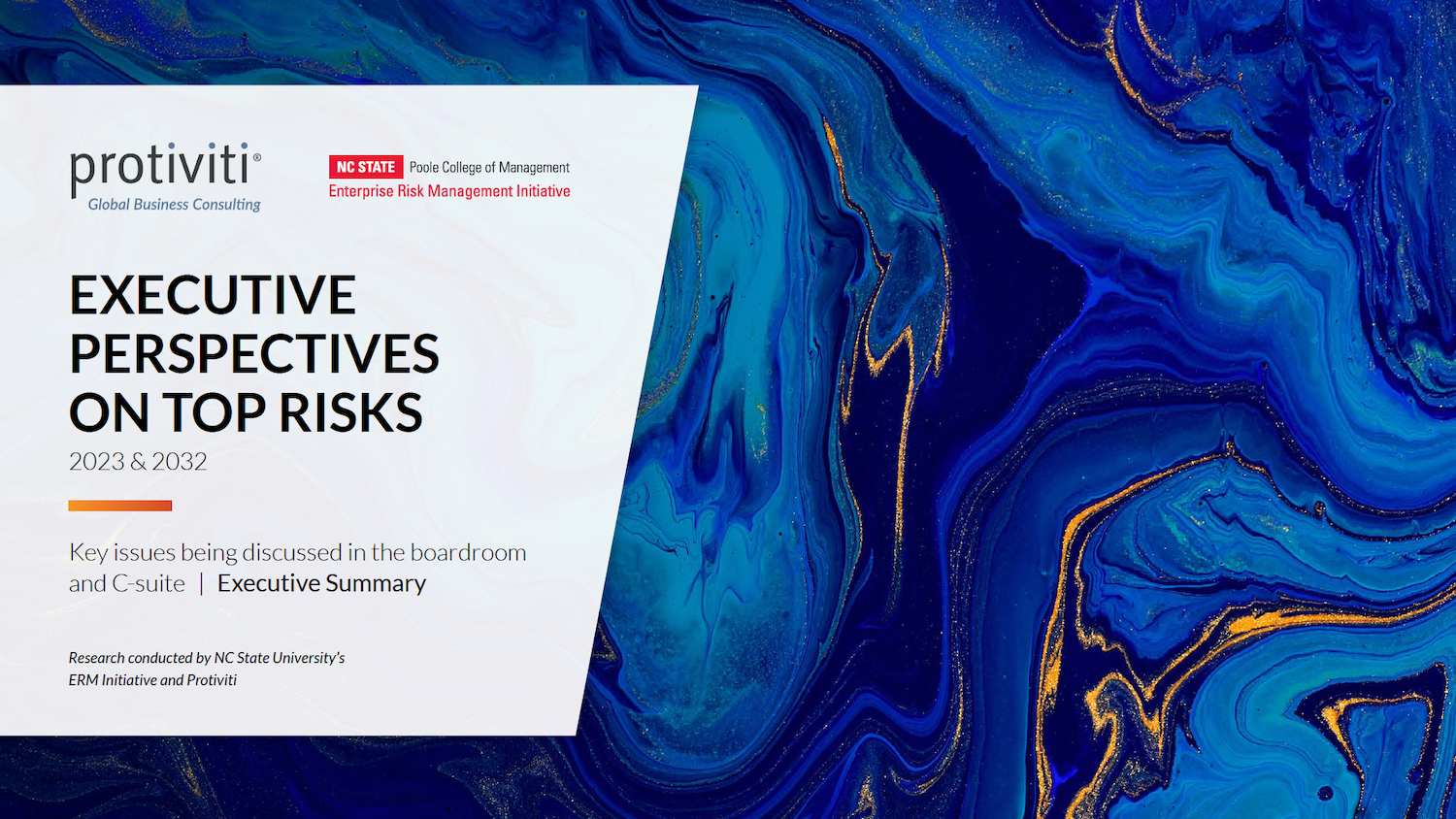Disruption and Ongoing Economic Uncertainty Among Top Concerns of Global Business Leaders
In the riskiest business environment in more than ten years, talent woes continue to top the list of concerns

Media Contact:
Maria Potepalova
NC State University
919.513.7238
mpotepa@ncsu.edu
Kathy Keller
Protiviti
408-808-3242
kathy.keller@protiviti.com
MENLO PARK, Calif., December 8, 2022 – According to a new survey from Protiviti and NC State University, uncertainty in today’s marketplace is presenting both new and ongoing risks for executives and board members. Alongside talent, labor and culture-related risks, the survey also reveals that senior decision-makers remain concerned about broader macro risks such as the softening economy and the state of global supply chains.
The 11th annual survey, titled “Executive Perspectives on Top Risks for 2023 and 2032,” was conducted by global consulting firm Protiviti and NC State University Poole College of Management’s Enterprise Risk Management (ERM) Initiative. The study surveyed 1,304 board members and C-suite executives from organizations around the globe in a variety of industries, asking them during September and October 2022 to rate 38 macroeconomic, strategic and operational risks for 2023 and a decade ahead (2032).
The Top Risks for 2023
Continuing a trend reported in last year’s survey, three of the top four risks highlighted by survey respondents for 2023 are related to talent. Of the 38 risks included in the survey, the top five risks identified by business leaders for the coming year are:
- Organizational succession challenges and ability to attract and retain top talent
- Economic conditions (including inflationary pressures)
- Increased labor costs
- Resistance to change in company culture
- Uncertainty surrounding organizational core supply chains
Looking ahead to 2032, talent attraction and succession planning remain a primary concern, especially the need for tomorrow’s talent to become fluent in a series of fast-moving emerging technologies such as quantum computing, advanced AI and the metaverse.
The Top Risks Through 2032
Survey respondents also rated the expected impact of the 38 risks in 2032, assessing how the risk landscape might shift over the coming decade. The top five risks identified for 2032 are:
- Organizational succession challenges and ability to attract and retain top talent
- Adoption of digital technologies requiring reskilling and upskilling employees
- Speed of disruptive innovations enabled by advanced technologies
- Resistance to change in company culture
- Ensuring data privacy and compliance with growing identity protection expectations and regulations
“In the current tight labor market, talent retention has naturally become a top risk that executives are worried about, however, with the added complication of a softening economy, they need to tread carefully,” said Pat Scott, EVP, Global Industry and Client Programs, Protiviti. It’s important that executives are weighing today’s economic pressures against the possible costs a decade from now and are making prudent organizational choices that increase their company’s resilience next year while laying the foundation for success in the years to come.”
“This year’s survey results should drive proactive leaders to take action,” said Jim DeLoach, a Protiviti managing director and co-author of the report. “Executives should weigh the current economic conditions to adjust their talent and risk management strategies. Employees are just as important as customers and should be treated as such in all decision-making in the coming months. Longer term, continued investment in succession planning, integrated upskilling and technology learning will help companies excel in employee engagement and broader corporate strategy, fulfilling the value proposition underpinning investments in new technologies and digital innovation.”
Mark Beasley, professor and director of the Enterprise Risk Management Initiative, Poole College of Management, NC State University and co-author of the report, said: “It’s clear that uncertainty abounds across the economy, which has triggered heightened risk concerns for executives and boards. The overall severity and magnitude of risks are at the highest level we’ve observed over the last 11 years this study has been conducted.”
Thinking a decade ahead to 2032, survey respondents still had talent retention and succession planning top of mind, but this concern reflects longer-term uncertainty over rapidly advancing emerging digital technologies and the privacy and security risks they may bring.
“Looking back ten years ago, it’s remarkable how much technology has reshaped the workplace since then, and the pace of change will only accelerate in the next decade. Technologies like the cloud, enterprise-grade AI, quantum computing and the metaverse were immature or nonexistent ten years ago but might become table stakes by 2032,” said Carol Beaumier, a Protiviti senior managing director and global leader of the firm’s thought leadership program. “Companies need to think about how their people will continue to adapt, learn and embrace these technologies. A long-term outlook helps companies focus on where to invest to be better prepared and more resilient beyond 2023.”
Survey Resources Available
The “Executive Perspectives on Top Risks for 2023 and 2032” report from Protiviti and NC State University provides survey results broken out by company type, size, industry, geographic region and respondent role. In addition, the report includes recommendations of important steps executives should take to maximize their organizations’ chances of future success while mitigating their risk profile, as well as diagnostic questions to consider when evaluating their organization’s risk assessment and risk management processes.
The survey report, along with an executive summary, infographic and podcast, is available for complimentary download here and on NC State’s website. Protiviti will host a one-hour webinar on January 11, 2023, at 9:00 a.m. PST/noon EST with a panel featuring Beasley, Beaumier and DeLoach who will be joined by Kim Bozzella, Protiviti global leader of Technology Consulting and Fran Maxwell, Protiviti global leader of the Workforce and Organizational Transformation practice, to discuss the implications of the Top Risks survey’s findings. Attendance is complimentary with registration here.
About Protiviti
Protiviti (www.protiviti.com) is a global consulting firm that delivers deep expertise, objective insights, a tailored approach, and unparalleled collaboration to help leaders confidently face the future. Protiviti and its independent and locally owned Member Firms provide clients with consulting and managed solutions in finance, technology, operations, data, digital, legal, governance, risk and internal audit through its network of more than 85 offices in over 25 countries.
Named to the 2022 Fortune 100 Best Companies to Work For® list, Protiviti has served more than 80 percent of Fortune 100 and nearly 80 percent of Fortune 500 companies. The firm also works with smaller, growing companies, including those looking to go public, as well as with government agencies. Protiviti is a wholly owned subsidiary of Robert Half (NYSE: RHI). Founded in 1948, Robert Half is a member of the S&P 500 index.
About the ERM Initiative
The ERM Initiative (www.erm.ncsu.edu) in the Poole College of Management at North Carolina State University provides thought leadership to help executives and boards strengthen their oversight of enterprise-wide risks as they develop and implement strategies for growth. The ERM Initiative’s website hosts over 600 articles, thought papers, and best practices documents to help business leaders navigate today’s uncertainties for tomorrow’s strategic success.
###
Protiviti is not licensed or registered as a public accounting firm and does not issue opinions on financial statements or offer attestation services.
Editor’s note: Infographic and photos available upon request.
- Categories:


